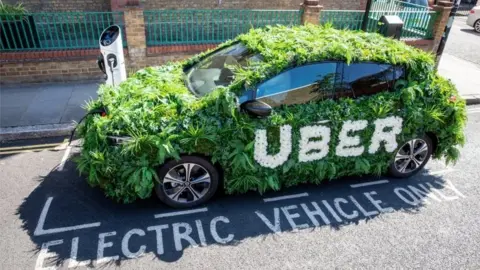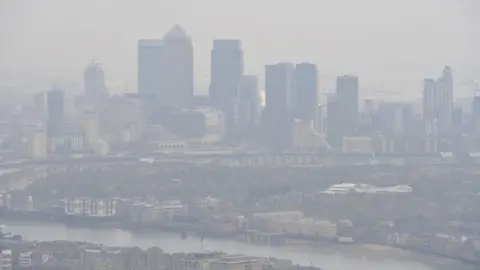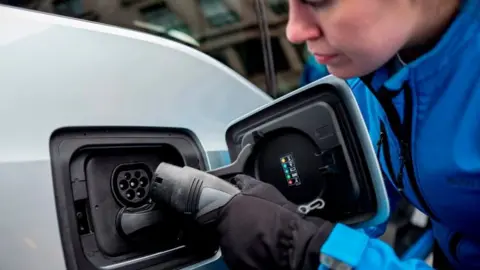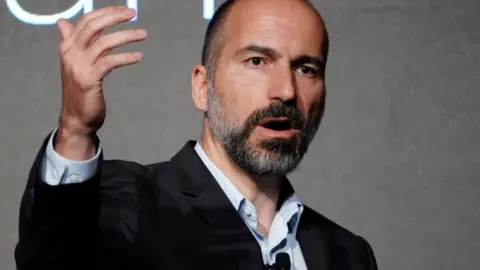London Uber drivers to charge electric car fee
 PA
PAUber is planning to add a surcharge to all fares booked via its app in London to help its drivers buy electric vehicles.
The fee, expected to be 15p per mile, will be introduced "early" in 2019.
Uber said drivers working for 40 hours per week could get cash help of about £1,500 a year from passengers via the top-up fee.
The ride-hailing firm said the scheme would also contribute towards plans to curb air pollution in the capital.
Uber said it expected the scheme to raise more than £200m ($260m) over the "next few years" to help drivers swap vehicles. It said the fee would add about 45p to the average London journey.
 PA
PAIt hopes to hand cash to 20,000 drivers to help them switch by 2021 and get all of them converted by the middle of that decade. Uber currently has about 40,000 drivers in London.
High cost
Dara Khosrowshahi, Uber's chief executive, said in a statement that the plan was a "a long-term investment in the future of London aimed at going all electric in the capital in 2025".
He added: "Over time, it's our goal to help people replace their car with their phone by offering a range of mobility options - whether cars, bikes, scooters or public transport - all in the Uber app."
It said the introduction of the fee would build on other partnerships it has fostered to improve London's infrastructure for electric vehicles which have led to the installation of more charging points.
In a statement, a spokeswoman for the Mayor of London said Uber's recognition on the importance of clean air was a "positive step".
She added: "Electric cars are not a complete solution. We also need to address the damaging impact that the rising number of private hire vehicles has on congestion and air pollution."
The Uber initiative comes soon after the UK government cut subsidies for buying greener cars. From 9 November, grants for plug-in hybrids will stop and those for all-electric cars will shrink from £4,500 to £3,500.
 Getty Images
Getty ImagesProfessor David Bailey, an expert in industrial strategy from Aston University, said the move was a "welcome first step".
"Uber is not doing this out of the goodness of its heart," he told the BBC, explaining that larger London plans to clean up the capital's air will put more and more restrictions on the types of vehicles that can pass through it.
"If they don't act they risk not having any drivers or customers," he said.
"The move to electric cars is going to happen anyway and they want to be seen to be playing their part," said Prof Bailey.

Analysis by Rory Cellan-Jones
 Reuters
ReutersUber's plan looks very ambitious.
The average driver on the road for 40 hours a week will build up £4,500 from the clean air levy over three years - but that will still leave many of them struggling to afford an electric car.
By then some of them will have moved on - after all, Uber driving is often a short-term activity - and the money they have saved will just go back into the central fund.
But the biggest problem is going to be charging. Most drivers will not have off-street parking where they can plug in overnight.
Dara Khosrowshahi admits there is a problem with the infrastructure. "The city is going to need to invest in it and we'll need to support them."

Other concrete steps Uber could take would involve it letting drivers of electric vehicles keep more of the cash passengers pay, he said.
"There are still quite significant barriers to electric vehicle take-up," said Prof Bailey.
The relatively high cost of electric vehicles was one factor, as was the lack of charging points and fears about range.
Those problems would be solved in time, he said, but government and other policy makers also needed to think about smarter ways to get people moving to using electric cars and other vehicles.
